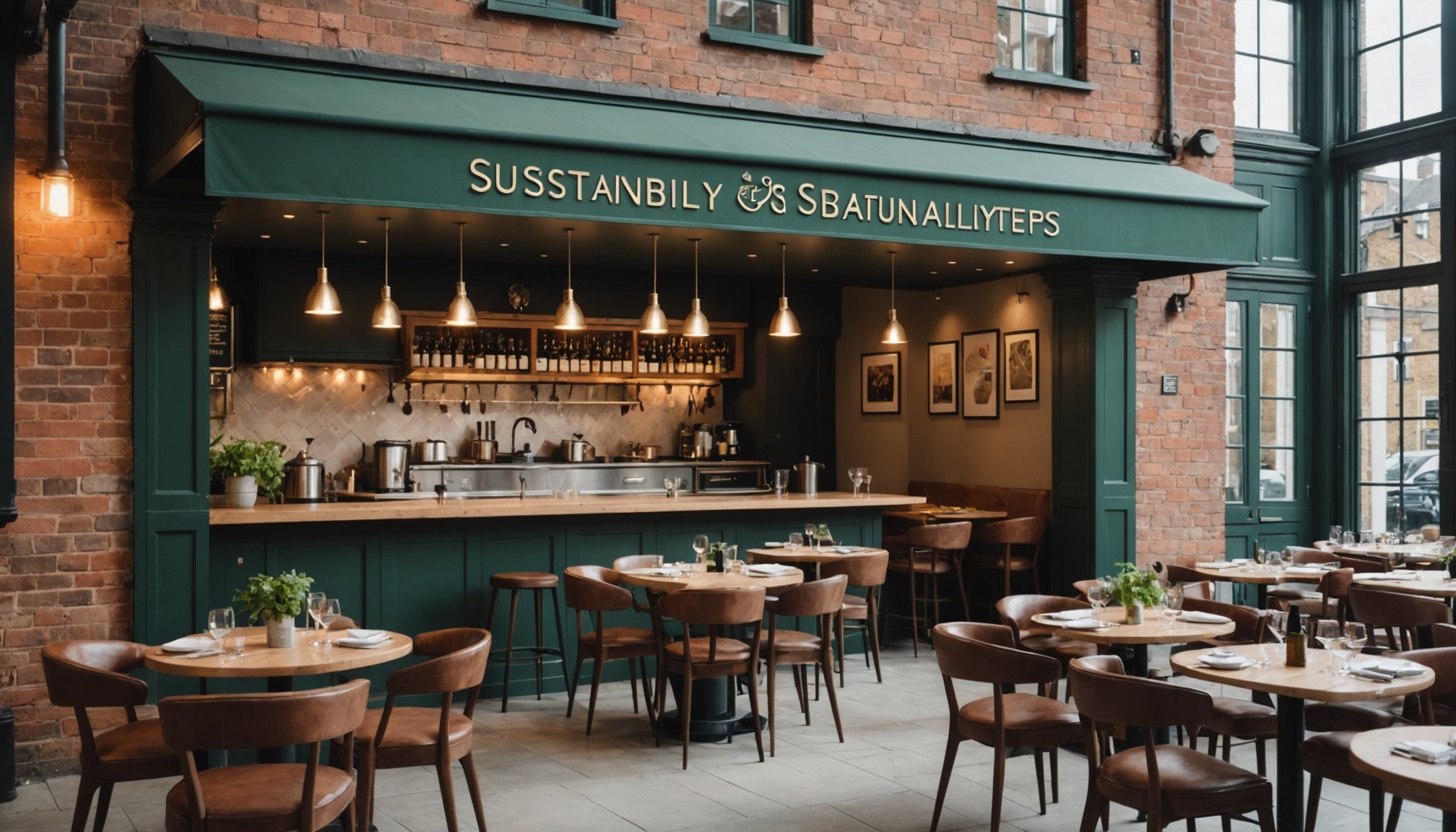As the world grapples with climate change and environmental degradation, the restaurant industry in the UK finds itself at a critical juncture. Sustainability has transitioned from a niche concern to a central pillar of business strategy. With increasing pressure from consumers demanding eco-friendliness and transparency, restaurants must adapt to retain their clientele and ensure their longevity. This article delves into the multifaceted role of sustainability in UK restaurants, exploring how concepts such as waste reduction, energy conservation, and local sourcing can reshape the dining landscape. We will examine what sustainability means for the hospitality industry, and why it is essential for businesses looking to thrive in the future.
Understanding Sustainability in the Restaurant Industry
To appreciate the pivotal role of sustainability in the restaurant sector, it is essential to define what sustainability entails. At its core, sustainability refers to practices that meet the needs of the present without compromising the ability of future generations to meet their own needs. In the context of restaurants, this encompasses various aspects, including the sourcing of ingredients, energy consumption, waste management, and overall environmental impact.
Also read : How can you use seasonal events to drive traffic to your UK bar?
Restaurants are significant contributors to food waste, with the UK alone wasting an estimated 1.4 million tonnes of food each year. This alarming statistic underlines the urgent need for sustainable practices. By adopting sustainable sourcing strategies, restaurants can minimize waste and make a positive impact on the environment.
Moreover, sustainable practices extend beyond food waste. They include energy-efficient operations, such as using energy-saving appliances, and water conservation measures that reduce consumption. This comprehensive approach not only benefits the environment but can also lead to significant cost savings for businesses.
Additional reading : How can you incorporate seasonal ingredients into your UK restaurant menu?
In this context, sustainability should not be viewed as merely an obligation but as an opportunity for restaurants to differentiate themselves in a competitive market. Today’s consumers are increasingly aware of their choices and often prefer businesses that align with their values—an essential factor for restaurants aiming to attract and retain customers.
In summary, understanding the various dimensions of sustainability is crucial for restaurants looking to navigate the evolving landscape of the hospitality industry. By embracing these principles, they can foster a more responsible dining experience that resonates with modern consumers.
The Impact of Consumer Demand on Sustainable Practices
Consumer behavior plays a pivotal role in shaping the sustainable practices of restaurants across the UK. Nowadays, diners are not just looking for great food and ambiance; they are also increasingly concerned about the environmental impact of their dining choices. This shift in priorities is compelling restaurants to adopt more sustainable practices.
Research indicates that a significant portion of consumers, particularly younger generations, prefer to patronize establishments that demonstrate a commitment to sustainability. This demand can manifest in various ways, from sourcing local ingredients to implementing waste reduction strategies. When patrons perceive a restaurant as environmentally conscious, they are more likely to choose it over competitors that do not prioritize sustainability.
Additionally, many consumers are becoming more knowledgeable about the environmental implications of their dining habits. They seek transparency about sourcing, energy use, and waste management. Restaurants that can effectively communicate their sustainability efforts not only build trust but also foster loyalty among their customer base.
Moreover, the rise of social media has amplified this trend. Diners love to share their experiences, and restaurants that showcase their sustainable practices can garner significant attention online. From farm-to-table stories to innovative waste management initiatives, these narratives resonate with audiences seeking authenticity. Thus, the impact of consumer demand extends beyond mere patronage; it can enhance a restaurant’s overall brand image.
In conclusion, the evolving preferences of consumers are a driving force behind the integration of sustainability in the restaurant industry. By aligning their offerings with consumer values, restaurants can secure their place in the market while contributing to a more sustainable future.
Innovative Waste Management Strategies
Efficient waste management is a cornerstone of sustainability for restaurants looking to reduce their environmental footprint. Restaurants generate vast amounts of waste, not only from food but also from packaging and other materials. To address this challenge, many establishments are turning to innovative waste management strategies that not only mitigate waste but also promote a culture of sustainability within their operations.
One prominent approach is the adoption of composting systems. By composting food scraps and organic waste, restaurants can significantly reduce the amount of waste sent to landfills. This practice not only minimizes waste but also produces nutrient-rich compost that can be utilized in local gardening projects or sold to consumers, creating a closed-loop system that benefits the community.
Another effective strategy is donating excess food to local charities or food banks. Many restaurants are establishing partnerships with organizations that facilitate food donations, ensuring that edible food does not go to waste and instead helps those in need. This not only addresses the issue of food waste but also positions the restaurant as a socially responsible entity within the community.
Furthermore, implementing a waste audit can help restaurants identify areas for improvement. By analyzing waste streams and understanding what is being discarded, businesses can make informed decisions about menu planning and ingredient sourcing. For example, if a restaurant discovers that a significant amount of a particular ingredient is going to waste, it may choose to adjust its menu or find alternative uses for that ingredient.
In summary, innovative waste management strategies are essential for restaurants aiming for sustainable operations. By embracing practices like composting, food donation, and waste audits, restaurants can significantly reduce their environmental impact while contributing positively to their communities.
Energy Efficiency and Sustainable Practices in Restaurants
Energy consumption is another critical area where restaurants can implement sustainable practices. The hospitality industry is known for its high energy usage, from cooking and refrigeration to lighting and heating. Implementing energy-efficient measures can not only reduce a restaurant’s carbon footprint but also lead to substantial cost savings over time.
One practical step restaurants can take is to invest in energy-efficient appliances and equipment. Energy Star-rated ovens, dishwashers, and refrigeration units consume significantly less energy than their conventional counterparts. Additionally, incorporating smart technology, such as programmable thermostats and energy management systems, can optimize energy use throughout the establishment.
Moreover, restaurants can explore renewable energy sources, such as solar panels. While the initial investment can be substantial, the long-term benefits—both financially and environmentally—can be significant. Restaurants that utilize solar energy can reduce their reliance on fossil fuels, lower their energy bills, and market themselves as eco-friendly establishments.
Lastly, employee training is crucial for fostering a culture of sustainability within the restaurant. Staff should be educated on the importance of energy conservation, including simple practices like turning off equipment when not in use or maintaining refrigeration temperatures efficiently. By involving employees in sustainability initiatives, restaurants can enhance their operations and create a more engaged workforce.
In conclusion, energy efficiency is a vital aspect of sustainability in the restaurant industry. By adopting energy-efficient practices and technologies, establishments can significantly reduce their environmental impact and improve their profitability.
As we look towards the future of the UK restaurant industry, the role of sustainability is becoming increasingly prominent. With consumer demand driving the need for eco-friendly practices, restaurants must prioritize sustainability in their operations. From waste management to energy efficiency and sourcing local ingredients, there are myriad ways for establishments to embrace sustainability and build a more resilient business model.
Ultimately, the future of dining will be characterized by a commitment to reducing environmental impact and enhancing community ties. By adopting sustainable practices, restaurants not only cater to the preferences of modern consumers but also contribute to the preservation of the planet for future generations. As such, the onus is on the hospitality industry to lead the charge towards a more sustainable future, creating dining experiences that are not only delicious but also responsible.











